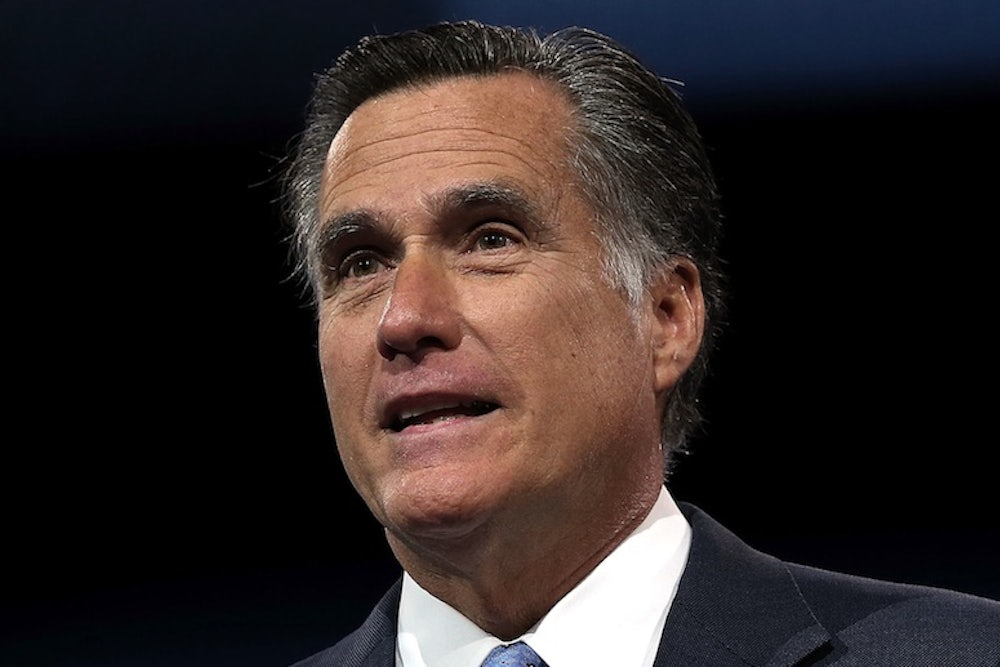According to a new academic study, reports Slate and a bunch of other places, a single trader was responsible for between $4 and $7 million in Intrade bets on Mitt Romney during the final two weeks of the 2012 election cycle. The presumption is that this individual—who, needless to say, lost his or her money—was deliberately trying to skew the market, which was watched heavily by many journalists, to portray Romney as having a better chance of winning than he actually did. Indeed, Intrade routinely did show Romney having a better chance of winning the election than various poll sites did. Perhaps even more notably, bookies pegged President Barack Obama’s chances as higher than Intrade did, and, as The New Yorker’s John Cassidy noted last March, “In an efficient financial market, such discrepancies shouldn’t persist, because they create arbitrage opportunities.” In fact, Cassidy was writing on the occasion of Intrade shutting down due to “financial irregularities,” which could very well be related to this new revelation.
The defense of Intrade was always that it was fairly reliable because it combined the putatively formidable wisdom of crowds with the additional control of people staking money. If you ask someone, “Who do you think is going to win?” and charge them nothing, he could give all kinds of answers; make him put ten bucks on it, and he is going to try to get it right.
The potential flaw was equally obvious. Because you could bet however much you wanted (each bet could only be up to $10, but there was no limit on the number of bets you placed), the system was easily gamed: Somebody with money to spare and with the intent not to make money but to move the market in the service of a candidate could throw the market’s predictive value off by betting with his partisanship rather than his purse. Apparently, this is exactly what happened.
In other words: The problem with Intrade is that it billed itself as a basically honest and accurate distillation of its participants’ true desires and leans, but in reality the ability of some participants to spend much more money than other participants distorted the outcomes so that the results were no longer representative of a democratic (or “efficient”) process (or “market”).
But, of course, this is our actual political system! Wealthy and willing people are able to exert influence far outside their status as individuals possessing single votes by spending significant sums of money to help influence the campaign. During 2012, an individual could have donated $2500 to Romney during the primaries, another $2500 during the general, and $30,800 to the Republican Party—$35,800, or $71,600 for a couple. Well over half of U.S. households did not make that much money in 2011.
But the Intrade Orca (as I have decided to call him or her) is presumably a high-roller. 70k is lunch money. For such fish—excuse me, whales—the U.S. political system has the SuperPACs, those technically unaffiliated groups which may, under the Citizens United ruling, accept unlimited donations, as well as tax-exempt groups that can advocate for issues. Sheldon and Miriam Adelson donated a reported $70 million last cycle. Whoever placed the Intrade bets just, in a sense, gave to one more SuperPAC.
“Here's why you should care,” hand-wrings Mark Gongloff, The Huffington Post’s chief financial writer. “We media types watch prediction markets closely because they are seen as infallible gauges of conventional wisdom. Romney is surging! It says so on Intrade! But if these markets can be manipulated, maybe we should look at them a little more skeptically.” He is, of course, right about the extent to which such markets should not be taken as “infallible gauges of conventional wisdom.” But in a broader sense, they should be embraced as a tidy metaphor of our actual, deeply skewed political system. Intrade loathing has a whiff of neuroticism to it, as though its foibles hit too close to home. The truth is: We are Intrade; Intrade is us. When you acknowledge that, it becomes easier to see that Intrade isn’t the thing that needs fixing.
